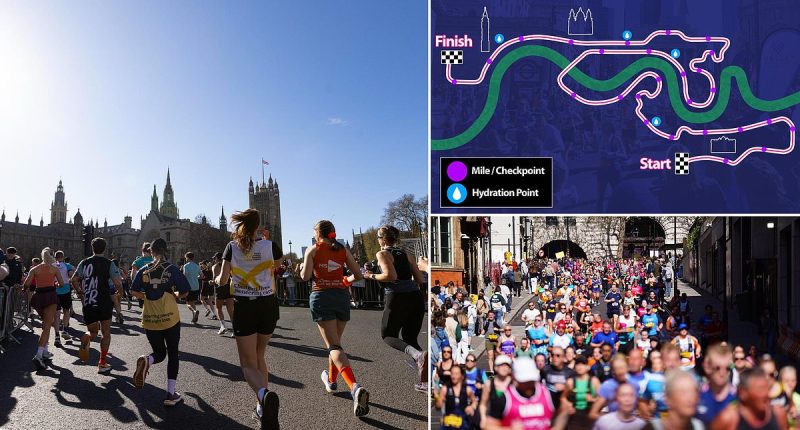Share this @internewscast.com
Ninety thousand runners will take part in London and Manchester marathons this week—and despite months of training the events are not without risk.
For those taking part in the gruelling 26.2 mile race, researchers warn that participating in such an extreme event could prove deadly.
Since the inaugural London Marathon in 1981, a total of 13 runners have died.
Experts say that a combination of genetic factors, race conditions and age can leave individuals in peril.
A major review of studies published in the British Medical Journal in 2019 found that the death rate for running a marathon was one fatality per 149,968 participants—meaning that someone is likely to die once every three years running the London Marathon.
An unnamed 36-year-old man died during the race in 2022, so, if the experts’ calculations are correct, there could be a tragedy this year.
They also found that men were more than twice as likely to suffer catastrophic problems—and the average age of marathon runners who have died is 41.
The researchers concluded that the risk was small but deaths were more likely to occur in the last quarter of the race.

Since the inaugural London Marathon in 1981, a total of 13 runners have died
The most likely reason for fatality is a sudden cardiac arrest.
‘The reason why [heart failure] happens with exertion, and, in particular with dehydration, is that there’s a decrease in the blood volume,’ says Dr Peter McCullough, a cardiologist at the Baylor University Medical Center at Dallas.
He explains that for younger marathon runners that die during a race it is likely due to a genetic problem.
‘When someone suddenly dies in an athletic event, particularly in teenagers and those in their 20s and 30s, the most common cause is hypertrophic obstructive cardiomyopathy,’ says Dr. McCullough
‘This is a genetic abnormality of the proteins used by heart muscle cells.
‘The heart becomes abnormally thick in one area and when the heart pumps, it has trouble ejecting blood past that thick point.’
As to why some deaths seem to occur at the end of the race, McCullough says, ‘There’s still a lot of circulating adrenaline so the heart is pumping very, very hard, but there’s relatively little blood to fill it.’
Other factors include a build up of lactic acid, humidity and dehydration.

The route for this years London Marathon

According to Peak Performance, seven cardiac deaths occurred between 1991 and 2003
Experts say that there has been a rise in fatalities in recent years.
Dr Dan Tunstall-Pedoe, former London Marathon Medical Director, wrote in journal Sports Medicine that an increase in the sport’s popularity was one contributor to the apparent increase in deaths.
He examined the records of documented sudden deaths across 650,000 marathon completions during that time, concluding that such risk in the London Marathon was one in 80,000 finishers.
Studies have shown though the survival rate after having a heart attack has increased significantly in the last two decades.
In a paper published in March, American researchers analysed data from 30million runners and found that the risk of dying from cardiac arrest at a race has decreased by approximately 50 per cent compared with 2000 to 2009.
‘The incidence of cardiac arrest has remained relatively stable, apart from a slight unexplained rise after 2020, but despite that, the risk for death has markedly declined, by close to 50 per cent,’ said Jonathan Kim, MD, cardiologist at Emory University in Atlanta, at the American College of Cardiology Scientific Session last month.
‘We believe this is due to continued enhancements in the emergency action plans.’
According to Peak Performance, seven cardiac deaths occurred at the London Marathon between 1991 and 2003.

Matt Campbell, 29, died after collapsing at the 22.5mile mark of the London Marathon

Captain David Seath (R) suffered a suspected cardiac arrest while running the marathon in 2016
In 2007, David Rodgers died after completing his first London Marathon because he drank too much water.
Rogers, 29, collapsed at the end of the race and passed away in Charing Cross Hospital.
Five years later, a 30-year-old woman collapsed and died while running in the London Marathon—near St James’ Park, on the final stretch of the 26.2-mile course.
A year later, another runner, Claire Squires, 30, suffered a cardiac arrest towards the end of the race and never regained consciousness.
An inquest heard the drug DMAA, a now-banned substance found in some nutrition supplements that was legal at the time, was in her system.
The coroner said she died of cardiac failure caused by extreme exertion, complicated by DMAA toxicity.
Captain David Seath, suffered a suspected cardiac arrest while running the 26.2-mile course in 2016 and later died in hospital. Seath was a fire support team commander in the 29 Commando Regiment Royal Artillery.
In 2018, Matt Campbell—who appeared on Masterchef: The Professionals—died after running the hottest-ever London Marathon.
Campbell collapsed during the marathon just four miles from the finish.
In the last death, the 36-year-old man collapsed just two miles from the finishing line.
Despite receiving immediate medical treatment and ambulance assistance within three minutes, the participant later died in the hospital.
Experts warn that people with known heart disease or other medical conditions should speak to their doctor before embarking on a major run.














